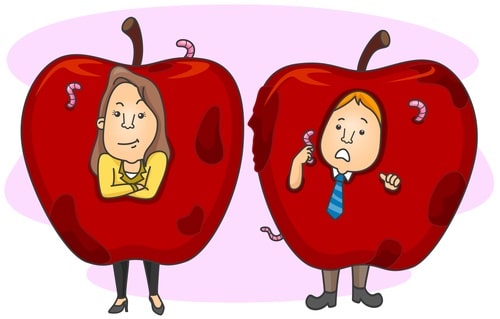In almost every roundtable I facilitate, one business owner laments the difficulty in finding skilled employees in today’s economy.
That’s why it’s easy to talk yourself into keeping a “bad apple”, but beware. A bad apple is a person whose negative behavior affects the rest of the group to varying degrees. Bad apples are like a virus to their teams and can have a negative impact on your entire business. Consider research on bad apples and team effectiveness by Will Felps, Terence R. Mitchell and Eliza Byington. They examined the impact of team members who were deadbeats (“withholders of effort”), downers (who “express pessimism, anxiety, insecurity and irritation”) and jerks (who violate “interpersonal norms of respect”). Their experiment found that having just one slacker or jerk in a group can bring down performance by 30% to 40%.
Felps and Mitchell define negative people as those who don’t do their fair share of the work, who are chronically unhappy and emotionally unstable, or who bully or attack others. They found that a single “toxic” or negative team member can be the catalyst for downward spirals in organizations.In one study of 50 manufacturing teams, they found that teams with a member who was disagreeable or irresponsible were much more likely to have conflict, have poor communication within the team and refuse to cooperate with one another. Consequently, the teams performed poorly.
“Most organizations do not have very effective ways to handle the problem,” said Mitchell. “This is especially true when the problem employee has longevity, experience and/or power. Companies need to move quickly to deal with such problems because the negativity of just one individual is pervasive and destructive and can spread quickly.”
Felps and Mitchell also found that negative behavior outweighs positive behavior — a “bad apple” can spoil the barrel and one or two good workers can’t undo the damage.
Bad is stronger than good. The negative thoughts, feelings and performance they trigger in others are far larger and longer lasting than the positive responses generated by more constructive colleagues.
How can you protect yourself from hiring a “bad apple”?Where employees work in teams, include team members in the hiring process. Check references and administer personality tests so that those who are low in agreeableness, emotional stability or conscientiousness are screened out.
If you already have a bad apple, discuss their attitude with them in private. When possible, try to place them in positions where they work alone. You may find that eventually you have no choice but to let that individual go.


